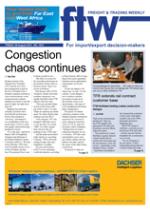The concept of selfregulation
for road transport
operators is to be piloted on
the North-South Corridor
(NSC) – a key trading route
in sub-Saharan Africa
extending from the Copperbelt
in the Katanga Province
in the DRC and northern
Zambia to the port of Dar es
Salaam in Tanzania to the
north-east, and to the SA
ports in the south.
Previously exclusively
confined to SA under the
Road Transport Management
System (RTMS), the selfregulation
concept was
planned to be piloted on the
Trans Kalahari Corridor, but
it has not got off the ground.
This is partly due to the lack
of progress in integrating
self-regulation with customs
accreditation, according to
Barney Curtis, executive
officer of the Federation of
East and Southern African
Transport Associations
(Fesarta), which is to play a
major role in the NSC pilot.
“This also fitted with
Fesarta’s brief from the
SA National Steering
Committee, which is to
direct the pilot project, to
extend the RTMS along the
corridors into Africa,” he
added.
The RTMS will be
piloted on a section of the
NSC, between Gauteng (or
Durban) and Lusaka, rather
than trying to introduce it to
the whole region at once.
In this initial pilot
scheme, three transport
operators will be approached
to participate in the
demonstration project – one
each from SA, Zambia and
Zimbabwe.
“If there is sufficient
interest,” said Curtis, “the
pilot can be expanded to two
operators in one or more of
these countries – that is a
maximum of six transport
operators.
“It will be necessary to
visit each transport operator
to explain the system
in detail and to get the
company’s commitment at a
senior management level.
“Fesarta will assist in
identifying prospective
companies through the
National Road Transport
Associations (NRTAs).”
Once the participating
transport operators have
been identified, they will
have to prepare for a “preaccreditation
audit” – the
purpose of which is to
identify the gaps between
where the company is at
present and where they
will have to be in order
to achieve certification in
terms of the standard.
“This visit will also obtain
company performance and
process data that will be
used to establish a baseline
reference point,” Curtis
added. “Depending on
the level of management
systems within each
company, these audits
can be conducted within
a month to two months of
the companies agreeing
to participate in the
demonstration project.
“Depending on the
gaps identified during
the pre-accreditation
audit, a period of between
two and six months will
typically be required for the
participating companies to
prepare for the full audit,
which, if passed, will
qualify them to become
accredited.”
“In the longer term,” said
Curtis, “should the pilot
project be successful, it will
be necessary to develop
regional standards on which
the self-regulation system
would be based.”
Self regulation to be piloted on North-South corridor
26 Aug 2011 - by Alan Peat
0 Comments
FTW - 26 Aug 11

26 Aug 2011
26 Aug 2011
26 Aug 2011
26 Aug 2011
26 Aug 2011
26 Aug 2011
Border Beat
Featured Jobs
New
